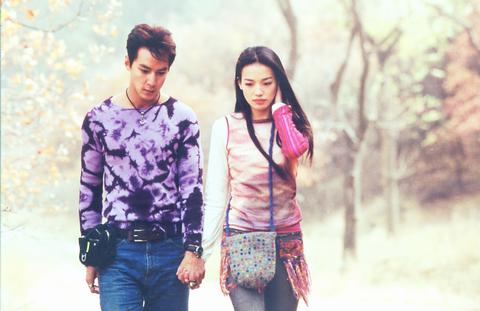What's your impression of Beijing? Tiananmen Square and tons of bicycles shuttling through ancient narrow alleys? Hong Kong director Mable Cheung (
It's late autumn in a Beijing suburb. Several old vans filled with a dozen long-haired young men and scantily-clad girls bounce down a yellow sand road en route to their next gig. Half naked when on stage, they shout out ancient Chinese poems in time with the heavy rhythms of noisy guitars. Sometimes their brand of rock `n roll is too "underground" and they're booed off the stage, replaced by young strippers wriggling to cheesy music for the crowd's entertainment.

PHOTO: COURTESY OF MEDIA ASIA
It's the typical life of Chinese rock gypsies. They're poor and come mostly from the provinces near Beijing to the big city in the hopes of becoming the next Tang Dynasty (
Beijing Rocks (
Daniel Wu (
It is definitely a journey of impression for the protagonist Wu as well as the film's director and writer duet, Mable Cheung and her husband, writer and producer Alex Law (
"I dreamed about rock `n roll in my childhood. So when I decided to make the film I intended to present an entirely different visual style," Cheung said.
Alex Law, who produced and helped pen the story, talked about the original idea of the film. He and Cheung's previous film, The Soong Sisters (
In order to make their case to have the film screened in its original version, the couple stayed in Beijing during the autumn and winter of 1997. There they spent considerable time hanging out with their actors around the city's underground rock scene and were impressed with what they saw.
"[Bands in Beijing] are very much like the underground hard rock groups found in the West during the 1970s. But the people here in Beijing are poorer and even more idealistic," said Law.
For all its effort, the film relies too heavily on atmosphere, time-lapse photography and the filmmakers' impressions of Beijing's rock scene. The storyline is rendered a bit weak, although it vividly captures the jargon of Beijing's more rambunctious youth. There are several witty outtakes of the rockers talking about their dreams. There are even some touching scenes which deal with strained father-and-son relations: Geng Le reconciles with his train-driving father; and Daniel Wu makes up with his wealthy dad during a KTV drinking session. But these bits remain somehow fragmented by overly-romanticized lens work.

One of the biggest sore spots in Taiwan’s historical friendship with the US came in 1979 when US president Jimmy Carter broke off formal diplomatic relations with Taiwan’s Republic of China (ROC) government so that the US could establish relations with the People’s Republic of China (PRC). Taiwan’s derecognition came purely at China’s insistence, and the US took the deal. Retired American diplomat John Tkacik, who for almost decade surrounding that schism, from 1974 to 1982, worked in embassies in Taipei and Beijing and at the Taiwan Desk in Washington DC, recently argued in the Taipei Times that “President Carter’s derecognition

This year will go down in the history books. Taiwan faces enormous turmoil and uncertainty in the coming months. Which political parties are in a good position to handle big changes? All of the main parties are beset with challenges. Taking stock, this column examined the Taiwan People’s Party (TPP) (“Huang Kuo-chang’s choking the life out of the TPP,” May 28, page 12), the Democratic Progressive Party (DPP) (“Challenges amid choppy waters for the DPP,” June 14, page 12) and the Chinese Nationalist Party (KMT) (“KMT struggles to seize opportunities as ‘interesting times’ loom,” June 20, page 11). Times like these can

Dr. Y. Tony Yang, Associate Dean of Health Policy and Population Science at George Washington University, argued last week in a piece for the Taipei Times about former president Ma Ying-jeou (馬英九) leading a student delegation to the People’s Republic of China (PRC) that, “The real question is not whether Ma’s visit helps or hurts Taiwan — it is why Taiwan lacks a sophisticated, multi-track approach to one of the most complex geopolitical relationships in the world” (“Ma’s Visit, DPP’s Blind Spot,” June 18, page 8). Yang contends that the Democratic Progressive Party (DPP) has a blind spot: “By treating any

You can tell a lot about a generation from the contents of their cool box: nowadays the barbecue ice bucket is likely to be filled with hard seltzers, non-alcoholic beers and fluorescent BuzzBallz — a particular favorite among Gen Z. Two decades ago, it was WKD, Bacardi Breezers and the odd Smirnoff Ice bobbing in a puddle of melted ice. And while nostalgia may have brought back some alcopops, the new wave of ready-to-drink (RTD) options look and taste noticeably different. It is not just the drinks that have changed, but drinking habits too, driven in part by more health-conscious consumers and